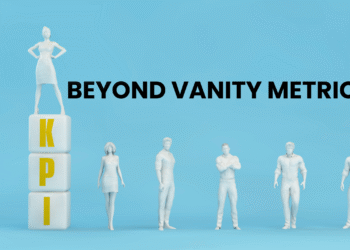Sub-Saharan Africa accounts for the smallest share of the global cryptocurrency economy, representing 2.7% of transaction volume worldwide between July 2023 and June 2024. The depth of Web3 understanding and adoption rates tell a different story, one of immense potential waiting to be unlocked. With Nigeria ranking second globally for crypto adoption and blockchain funding across Africa increasing by 1,668% in recent years, the foundation for a decentralised marketing ecosystem is rapidly taking shape.
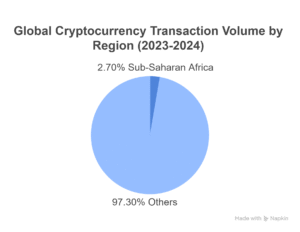
The Current Landscape: Africa’s Web3 Readiness
The data reveals Africa’s remarkable preparation for the adoption of Web3. According to recent surveys, decentralisation awareness reaches impressive levels across key African markets: 80% in Nigeria and 74% in South Africa, significantly higher than the 58% awareness rate in the United States. This foundational understanding positions African marketers to leverage decentralised technologies more effectively than their global counterparts.
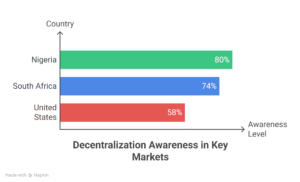 Nigeria has emerged as Africa’s fastest-growing Web3 developer hub, receiving $59 billion in crypto value in 2024, with $24 billion coming from stablecoins alone. Meanwhile, Kenya, Nigeria, and South Africa are leading the continent’s Web3 adoption, creating a triangle of innovation that could reshape regional marketing practices.
Nigeria has emerged as Africa’s fastest-growing Web3 developer hub, receiving $59 billion in crypto value in 2024, with $24 billion coming from stablecoins alone. Meanwhile, Kenya, Nigeria, and South Africa are leading the continent’s Web3 adoption, creating a triangle of innovation that could reshape regional marketing practices.
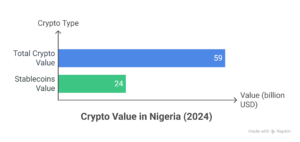 The broader blockchain technology market provides additional context for this transformation. Valued at $20.16 billion globally in 2024, the market is projected to reach $393.42 billion by 2032, representing a compound annual growth rate that signals unprecedented expansion opportunities for African marketers willing to embrace decentralised approaches.
The broader blockchain technology market provides additional context for this transformation. Valued at $20.16 billion globally in 2024, the market is projected to reach $393.42 billion by 2032, representing a compound annual growth rate that signals unprecedented expansion opportunities for African marketers willing to embrace decentralised approaches.
 Transforming Customer Data and Privacy
Transforming Customer Data and Privacy
Traditional marketing models have long struggled with data privacy concerns and customer trust issues. Web3 technologies offer African marketers a pathway to address these challenges while building more authentic consumer relationships. Blockchain’s immutable ledger system enables transparency in data collection and usage, allowing customers to maintain ownership of their personal information while choosing how to share it with brands.
In markets like South Africa, where internet users increased by 409,000 from January 2023 to January 2024, roughly 1,122 new users daily, the opportunity to establish trust-first marketing relationships from the ground up is substantial. This growing digital population can be introduced to marketing practices prioritising their data sovereignty from the outset.
The decentralised identity model inherent in Web3 allows consumers to authenticate themselves without relying on traditional intermediaries. For African brands, this means reduced dependence on foreign technology platforms and the ability to build direct, verifiable relationships with their audiences.
Revolutionising Customer Engagement Through Tokenisation
Web3’s tokenisation capabilities present African marketers with unprecedented tools for customer engagement and loyalty. Non-fungible tokens (NFTs) and branded cryptocurrencies can transform traditional loyalty programs into dynamic, tradeable assets that hold real value for consumers.
Consider the potential impact on Nigeria’s vibrant creative economy. Brands can collaborate with local artists to create NFT collections that serve multiple purposes: marketing campaigns, loyalty rewards, and cultural preservation. These digital assets can appreciate, creating genuine wealth-building opportunities for consumers while driving brand engagement.
Smart contracts enable automated, transparent reward systems that execute without human intervention. African brands can design loyalty programs that automatically distribute tokens based on purchase behaviour, social media engagement, or community participation, reducing operational costs while increasing customer satisfaction.
Decentralised Advertising: Eliminating Middlemen
The traditional digital advertising ecosystem relies heavily on intermediaries that extract value while providing limited transparency. African marketers spend significant portions of their budgets on platform fees, data costs, and third-party verification services. Web3 technologies offer an alternative model where advertisers can connect directly with their audiences.
Blockchain-based advertising platforms can eliminate the need for traditional ad exchanges, reducing costs and increasing transparency. Smart contracts can automatically execute advertising agreements, ensuring that brands only pay for verified interactions and engagement. This direct model particularly benefits smaller African businesses that previously couldn’t compete with larger companies’ advertising budgets.
The decentralised approach also enables more equitable revenue sharing. Content creators and influencers can receive immediate, transparent compensation for their promotional efforts, fostering a more collaborative marketing ecosystem that benefits all participants.
Financial Inclusion and Payment Innovation
Africa’s Web3 adoption is closely tied to financial inclusion initiatives. With many African consumers lacking access to traditional banking services, cryptocurrency-based marketing campaigns can simultaneously promote products while providing financial access.
Brands can distribute promotional tokens that function as both marketing incentives and financial instruments. These tokens can be used for purchases, saved as investments, or converted to local currencies, creating multiple touchpoints for customer engagement while addressing real economic needs.
The stablecoin market demonstrates Nigeria’s appetite for stable digital currencies, with stablecoin transactions approaching $3 billion in Q1 2024 alone for sub-$1 million transactions. This represents a significant portion of Nigeria’s total $59 billion crypto value received in 2024. Marketing campaigns that incorporate stablecoin rewards or payments can provide customers with inflation-resistant value while building brand loyalty.
Building Community-Driven Brand Ecosystems
Web3 technologies enable the creation of decentralised autonomous organisations (DAOs) around brand communities. African companies can establish governance tokens that give customers voting rights in product development, marketing strategies, and brand direction. This participatory approach aligns with traditional African community decision-making structures while leveraging modern technology.
Community ownership models can transform customers from passive consumers into active stakeholders. When community members hold tokens that increase in value as the brand succeeds, their incentives align with the company’s growth objectives, creating powerful word-of-mouth marketing effects.
These community-driven ecosystems can be particularly powerful in addressing local market needs. Community members can propose and vote on product modifications, marketing messages, and expansion strategies that reflect deep cultural understanding and market insight.
 Overcoming Infrastructure Challenges
Overcoming Infrastructure Challenges
Despite the promise of Web3 marketing, African marketers face significant infrastructure challenges. Internet connectivity remains inconsistent in many regions, and smartphone adoption, while growing, hasn’t reached universal levels. However, these challenges are also driving innovation in lightweight blockchain solutions and mobile-first Web3 applications.
Layer 2 blockchain solutions and mobile-optimised wallets are making Web3 technologies more accessible to African consumers. Marketing strategies must account for these infrastructure realities while positioning brands to benefit from ongoing improvements in digital infrastructure.
Progressive Web3 adoption strategies can help brands prepare for broader market readiness. Starting with simple blockchain-based loyalty programs or NFT collectables can familiarise customers with Web3 concepts while building the technical infrastructure for more sophisticated applications.
Regulatory Considerations and Compliance
The regulatory landscape for Web3 technologies in Africa remains evolving, with different countries taking varied approaches to cryptocurrency and blockchain regulation. This uncertainty creates both challenges and opportunities for marketing applications.
Forward-thinking African marketers are engaging with regulatory bodies to help shape frameworks that enable innovation while protecting consumers. Brands that demonstrate responsible Web3 marketing practices today will be well-positioned when regulatory clarity emerges.
Compliance strategies should focus on transparency, consumer protection, and educational initiatives that help customers understand Web3 technologies and their rights. Building trust through responsible practices will differentiate brands in an increasingly crowded digital marketplace.
The Path Forward: Strategic Implementation
Successfully integrating Web3 technologies into African marketing strategies requires a phased approach that acknowledges current market realities while preparing for future opportunities. Brands should begin by educating their audiences about Web3 concepts through content marketing and community engagement initiatives.
Pilot programs can test Web3 marketing concepts on a small scale, allowing brands to refine their approaches before broader implementation. These pilots should focus on solving real customer problems while demonstrating the value of decentralised alternatives to traditional marketing methods.
Partnerships with local Web3 developers, blockchain education initiatives, and cryptocurrency exchanges can accelerate adoption while building the ecosystem necessary for widespread success. African brands that invest in Web3 marketing capabilities today will have significant competitive advantages as the technology matures.
Measuring Success in Decentralised Marketing
Traditional marketing metrics must evolve to account for Web3 characteristics. Community engagement, token holder retention, and decentralised governance participation become important indicators alongside conventional measures like reach and conversion rates.
Blockchain’s transparency enables new types of marketing analytics that provide deeper insights into customer behaviour and campaign effectiveness. Brands can track the entire customer journey on-chain, from initial engagement through purchase and beyond, creating unprecedented visibility into marketing funnel performance.
Success metrics should also include community health indicators such as token distribution patterns, governance participation rates, and long-term holder percentages. These metrics reflect the sustainability and authenticity of Web3 marketing initiatives.
Conclusion: Embracing the Decentralised Future
Africa’s Web3 marketing revolution is not a distant possibility; it’s happening now. With 80% decentralisation awareness in Nigeria, $59 billion in crypto value received annually, and 1,668% growth in blockchain funding, the continent is positioned to leapfrog traditional marketing limitations and embrace decentralised alternatives.
The brands that succeed in this new paradigm will be those that understand Web3 as more than a technological upgrade; it’s a fundamental shift toward community-driven, transparent, and inclusive marketing practices that align with African values of collective prosperity and shared ownership.
As the global blockchain market grows from $20.16 billion to a projected $393.42 billion by 2032, African marketers who invest in Web3 capabilities today will not only revolutionise their practices but also contribute to the continent’s emergence as a global leader in decentralised marketing innovation.
The question is not whether Web3 will transform African marketing, but which brands will lead this transformation and capture the extraordinary opportunities it presents.
Ready to Navigate the Web3 Marketing Revolution?
The future of marketing in Africa is decentralised, and the time to act is now. Don’t let your brand fall behind as competitors embrace Web3 technologies to build stronger customer relationships, reduce costs, and create new revenue streams.
Take the Next Step:
Subscribe to Marketing Analytics Africa for cutting-edge insights on marketing strategies tailored for African markets
Join our exclusive Marketing Webinar, featuring African marketing leaders.
Contact us today to schedule a free consultation and discover how your brand can lead Africa’s marketing transformation.
Follow Marketing Analytics Africa:
LinkedIn: Stay updated with daily marketing insights
Twitter: Join the conversation about Africa’s digital marketing evolution
Newsletter: Receive weekly data-driven marketing analytics delivered to your inbox

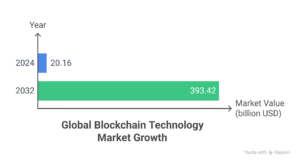 Transforming Customer Data and Privacy
Transforming Customer Data and Privacy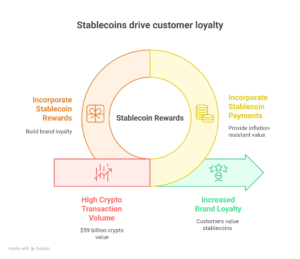 Overcoming Infrastructure Challenges
Overcoming Infrastructure Challenges
